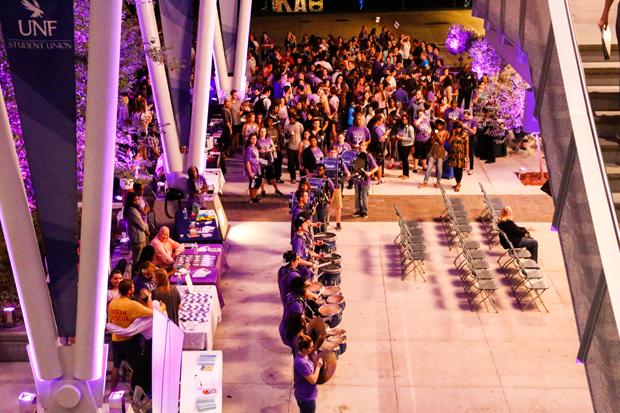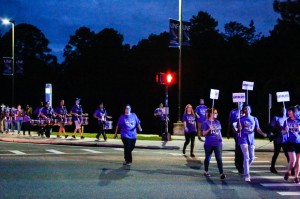
Photo by Robert Curtis
The sun dips behind the city skyline and evening comes to a close. A woman alone walks around the corner toward her car. The sound of her heels echoes off the walls of an empty alley. She is a mouse, discreet and swift. Streetlights are the glowing havens that she dares not stray very far from. She passes a man who eyes her with malicious intent, as he locks his shop and begins to follow behind her. Her heel-clicks on the pavement quicken in tempo and her heart pulses in her ears. Only a few strides to her jeep.
The man continues his gait while the woman fumbles to find her keys. In one fluid swoop she unlocks the door, hops in the seat, pushes the lock button and exhales in relief as she meets eyes with the passing man. The woman has come close to what she knows would have been a violent encounter.
This is a common but real scenario that most women have or will have to face at some point in their lives. In reality, the night can be an unavoidable and oftentimes dangerous place for women. Women can find themselves in vulnerable situations that can subject them to sexual violence. This is a reality women must face as we are reminded today by everything from the recent controversy over NFL star Ray Rice’s perpetration of domestic violence, to Gainesville’s string of assaults against women in September. It is a fact that violence against women is still a recurring issue. However, women are becoming empowered and fighting back.
October is Domestic Violence Awareness Month and many campuses are making the effort to raise awareness of domestic violence against women and how students, women and men can create a safer environment at night.
UNF’s Women’s Center participated in a movement that for the sixth year in a row hoped to shed light on the darkness of this social issue. UNF held Take Back the Night this past Wednesday, Oct. 1, where students marched to the beat of UNF’s drumline to stand up against violence against women, followed by a candlelight vigil that had survivors share their personal stories on the issue.
UNF is one of many campuses that participate in the Take Back the Night march. The movement’s mission is to end sexual violence of all forms. It started almost 30 years ago in Pennsylvania after a microbiologist student, Susan Alexander Speeth, was stabbed to death while walking home alone.
Director of UNF’s Women Center, Sheila Spivey, said she wanted to kick off Domestic Violence Awareness Month in a positive way. “We’re here to take a stand and march in solidarity and support anyone who has been impacted by violence,” she said.
Take Back the Night started at 6:30 p.m. in the Osprey Plaza with an awareness fair that had both campus and community resources available for students. The march began at 7:30 p.m. in the Osprey Crossings courtyard and ended at Osprey Plaza with a candlelight vigil and a speaker who talked about her triumph over sexual violence. Several performers took to the stage, singing and reading poems in light of the cause.
Lauren Makarov, UNF alumna, took the stage and stood behind the podium. She read her poem “When you realize”:
When a man takes a belt and threatens you,
You begin to feel like a child again.
When you consciously consider your every
move to avoid punishment,
you begin to live like a fugitive.
When you look into the mirror and realize
You’re in jail,
You know it’s time to wake up.
Makarov said she relieves her pain through poetry. Her story began in her undergraduate years. Her boyfriend of two years would verbally abuse her, and as time passed, the verbal abuse shifted to physical abuse. She said she stopped being with friends and family at the time because her boyfriend dominated her entire world.
It took several months, Makarov said, to end the relationship. After realizing who she was as a person, with help from her poetry, she ended the relationship: she survived. Poetry was Makarov’s way to get out the internal anguish she experienced.
Makarov volunteered as an advocate and later a counselor for Hubbard House, an agency that provides safety for victims and their children.

Photo by Robert Curtis
“It gave me such power to help other victims and empower them to move from victim to survivor,” Makarov said.
The emotional aftermath of abuse can be devastating. In her presentation, Makarov stated that 79% of 7,000 poll participants said that emotional abuse is worse than physical abuse. Emotional abuse leaves internal emotional damage. It’s difficult to know whether someone is going through the abuse if there are no external implications, and the person in the abusive relationship may not realize he or she is a victim. Makarov said she believes domestic violence victims can lose not only their identity but, also, their voice. When victims are able to find their voice again, they’re better able to break the silence.
“Anyone can be a victim, but what’s important is, is that nobody deserves to be abused,” Makarov said, “and what we each deserve is to be in a relationship that’s free from it.”
Makarov ended her speech with lines from her poem. She stepped off the stage.
In this part of the evening, the floor was open for anyone who wanted to speak up and to raise their voice.
There was a pause. No one came forward, at first.
Enter Emily Peters, a senior studying international business, bravely faced the sea of purple shirts. She told the crowd about her domestic abuse. She said her family didn’t approve that she was gay and verbally abused her for it. She said that UNF’s LGBT Resource Center has helped her during her difficult times.
Currently, Peters is working on a project that promotes international initiatives toward LGBT resources that includes the development of a map of colors that represent the level of acceptance in each country.
Afterwards, another student, Angi Barnard tucked her long curly hair behind her ear and entered the stage to tell her story. Barnard admitted that she had been avoiding the Take Back the Night event for several years. Coming from an abusive family, she stated, “I got into several abusive relationships.” One of her boyfriends would threaten the child Barnard hoped to adopt. She said he wouldn’t let her hang out with her friends anyone. She said she moved out of her parent’s house to live with her boyfriend.
But during a night when things escalated between them, she said he forced her to have sex with him. Barnard said she tried to tell her parents but they told her to not tell anyone. They told her that if she stopped talking, he would stop hurting her.
“So I stopped talking,” Barnard said.
Barnard said she’s the kind of person who can’t stop talking. This time, she said, she was completely silent. Barnard encouraged anyone in the crowd who was experiencing abuse to not be afraid to speak up.
“Do not stop talking. Do not let them tell you to stop talking because you don’t have to stop talking.”
After courageously speaking, she left the stage.
The ceremony continued. The white candles that were passed around earlier lit up the night sky. The students helped each other pass the flame. Younger generations participated amongst a crowd full of college students, and together, they stood up against violence and rape towards women. They took back this night from the abusers.
Gallery photos by Robert Curtis
[doptg id=”41″]Email Danae Leake at reporter29@unfspinnaker.com







